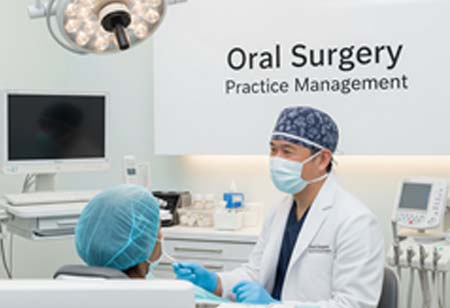Thank you for Subscribing to Healthcare Business Review Weekly Brief
Be first to read the latest tech news, Industry Leader's Insights, and CIO interviews of medium and large enterprises exclusively from Healthcare Business Review
Streamlining Excellence: Transformation of Oral Surgery Practice Management Services
Practices that invest in advanced management systems will have a strategic advantage in reputation, reach, and retention.

By
Healthcare Business Review | Tuesday, June 24, 2025
Stay ahead of the industry with exclusive feature stories on the top companies, expert insights and the latest news delivered straight to your inbox. Subscribe today.
The oral surgery practice management services market is transforming significantly, shaped by a growing need for efficiency, improved patient care, and regulatory compliance. The increasing demand for specialized dental procedures such as wisdom tooth extractions, dental implants, jaw alignment surgeries, and oral pathologies is one of the primary factors fueling market expansion.
As more patients seek advanced oral healthcare, oral surgery practices are challenged to streamline operations, maintain quality standards, and optimize administrative workflows. The pressure to manage scheduling, insurance billing, patient communication, and compliance while maintaining a high clinical service necessitates expert management solutions.
Scalable cloud-based platforms, centralized reporting, and standardized protocols are essential for maintaining quality and control across multiple sites. The growing consolidation trend within the dental industry, among specialty practices, will increase the demand for robust, enterprise-level practice management solutions.
The impact of oral surgery practice management services extends well beyond efficiency. By reducing administrative burdens, optimizing resource use, and enhancing patient experience, these solutions allow oral surgeons to focus more on delivering quality care. The result is improved patient outcomes, higher satisfaction scores, and stronger practice growth.
Growth Drivers and Market Trends
AI has become a central force in reshaping oral surgery practice management. The systems reduce manual effort and errors while accelerating response times, which enhances staff productivity and patient satisfaction. Predictive analytics tools are helping practices forecast patient volumes, manage surgical inventory, and identify high-risk patients based on historical data. AI-driven chatbots and virtual assistants now play an important role in answering patient queries, collecting preoperative information, and sending postoperative care instructions, increasing engagement and reducing no-shows.
The platforms consolidate electronic health records (EHR), billing systems, imaging data, and customer relationship management (CRM) into a single interface. The integration enhances real-time access to data across departments and supports remote access and data backup. There is a growing demand for mobile-friendly solutions that allow oral surgeons and administrative staff to monitor workflows, manage appointments, and access critical patient information on the go.
The need for such services is only expected to grow. As the aging population increases demand for oral surgeries and the aesthetic dental market expands, practices will face pressure to scale operations without compromising care. Regulatory scrutiny, insurance complexities, and rising consumer expectations will continue to challenge operational norms. Practice management services—especially those that leverage AI, automation, and cloud technologies—will play a pivotal role in enabling oral surgery centers to adapt, thrive, and deliver care consistently and precisely.
Applications Across Clinical and Administrative Functions
Oral surgery practice management services improve outcomes across clinical and business functions. Digital tools support surgeons with better treatment planning and coordination. Digital imaging systems integrated with patient records allow surgeons to visualize complex cases in 3D, enhancing accuracy and minimizing procedural risks. Integrating CAD/CAM systems enables efficient collaboration with dental laboratories for prosthetic fabrication. AI-enhanced diagnostics are beginning to support surgeons in identifying oral abnormalities, cysts, or tumors earlier, improving patient outcomes and facilitating timely interventions.
Practice management services are critical for managing insurance claims, coding procedures accurately, and tracking reimbursements. Automating these functions ensures timely and accurate revenue collection, reducing the burden on in-house staff and minimizing claim rejections. Appointment management systems with real-time availability and automated reminders help optimize daily schedules and minimize cancellations or delays. Patient relationship management tools are also vital in maintaining a high standard of service, automating post-surgical follow-ups, managing patient feedback, and sending educational materials that improve recovery and compliance.
The value of outsourcing or partnering with practice management service providers extends to compliance and legal functions. The services ensure that practices meet health data privacy standards (such as HIPAA in the U.S.), adhere to billing regulations, and manage professional licensure and credentialing. With regulatory bodies and insurers scrutinizing practices more closely, such support is critical in avoiding costly penalties and ensuring operational continuity.
Solutions and Future Outlook for the Market
While the benefits of oral surgery practice management services are significant, the market also faces several challenges. Many small and mid-sized practices rely on outdated systems or manual processes due to cost concerns or a lack of digital fluency. Transitioning to new systems requires training, operational adjustment, and, in some cases, temporary productivity dips. Vendors and consultants offer customized onboarding, modular software implementations, and ongoing support to mitigate this, ensuring a smoother transition and stronger long-term adoption.
Oral surgery practices must address concerns around patient data breaches, cyberattacks, and compliance with evolving data protection laws. The solution invests in secure, HIPAA-compliant platforms that use encryption, access controls, and audit logs. Interoperability with hospitals, insurers, and dental referral networks is essential for seamless data sharing and collaborative care, and vendors are prioritizing open APIs and data standardization to address these requirements.
Workforce management and talent retention are also pressing concerns. As the demand for oral surgery services grows, so does the need for trained support staff who can manage administrative workflows and maintain high standards of patient communication. Practice management solutions that include training modules, performance dashboards, and workload optimization can help practices distribute tasks more efficiently and retain top-performing staff through clarity and empowerment. Oral surgery practice management services are essential to modern dental operations.






